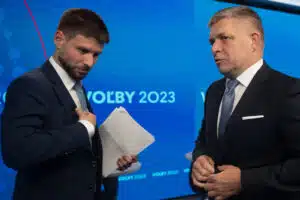Brussels – After the government, the presidency of the Republic. Left-wing nationalists in Slovakia are trying to pull off an en plein institutional coup, setting their sights on the presidential elections scheduled for March 23. With the exit of the incumbent president, the pro-European Zuzana Čaputová, the two Social Democratic parties in power after the Sept. 30 legislative elections will focus on a common candidate, the leader of HLAS-SD and Speaker of the National Parliament, Peter Pellegrini, with the likely convergence of the third majority force—the far-right pro-Russian Slovak National Party—in the event of a ballot on April 6.

Pellegrini announced last Jan. 8 his readiness to run in the presidential election with the support of Premier Robert Fico‘s SMER-SSD party, and today (Jan. 19) the officialdom of the candidacy has arrived. In Slovakia, the office of the president of the republic has mostly ceremonial significance, but it also holds some crucial powers at a time of predictable erosion of standards of the rule of law in the country following the installation of Fico’s nationalist, pro-Moscow government. In addition to ratifying international treaties and appointing judges to the top courts, he can especially veto laws passed by the parliament and grant amnesty, prerogatives currently in the hands of the pro-European Čaputová but soon likely to pass to the leader of the force that effectively decided the fate of the country after the polls.
At the moment Pellegrini appears to be the favourite in a runoff scenario. The most credible challenger is the Progressive Party candidate, former Minister of European Affairs Ivan Korčok, on whom all the centrist and liberal opposition parties might decide to converge in an attempt to curb the advance of the nationalists to win major institutional offices. Korčok could also take advantage of the wave of protests that have been sweeping Slovakia’s major cities for weeks in opposition to PM Fico’s plans to amend the Criminal Code by abolishing the office of the special prosecutor (which deals with serious crimes such as those related to organized crime and high-level corruption). The opposition’s complaint led by the leader of the Slovak Progressive Party and former Vice-President of the EU Parliament, Michal Šimečka, is of an attempt to weaken the judiciary, in a country where the current prime minister himself had to resign in 2018 following the murder of journalist Ján Kuciak and his girlfriend Martina Kušnírová, who had exposed links between the ‘ndrangheta and the Slovak elite (including members of his SMER party).

From left: the leader of the Slovak Progressive Party, Michal Šimečka, and the Prime Minister of Slovakia, Robert Fico (credits: Vladimir Simicek/Afp)
It is no coincidence that this week’s plenary session of the EU Parliament also received a harsh attack from a very large majority (496 votes in favour, 70 against, and 64 abstentions almost exclusively from far-right forces) to the new government in Bratislava. MEPs put on paper their doubts about Slovakia’s ability to fight corruption and protect the EU budget “should the proposed reform of the Criminal Code be adopted,” precisely because of the dissolution of the special prosecutor’s office. Adding to this are concerns about the “inappropriate and disrespectful language” used by PM Fico in reaction to opposition criticism, as well as plans to adopt “laws that undermine civic space, limit the work of NGOs and stigmatize organizations that receive foreign funding.” All this while recalling that verbal attacks on individuals and media representatives “in the past have contributed to an environment in which violent crimes have been committed” such as the murders of Kuciak and Kušnírová.
The red-black Slovakia
After last September 30 elections in Slovakia, the pro-Russian Social Democracy of SMER-SSD emerged as the leading force in Parliament, winning 22.95 per cent of the vote. In second place was the Progressive Party of the vice president of the EU Parliament, Michal Šimečka (17.96), and in third place HLAS-SD (14.70). With only four other parties above the 5 per cent threshold—the conservatives of OĽaNO, the Christian Democratic Movement, the liberals of Freedom and Solidarity, and the Euroskeptic pro-Russian right-wing Slovak National Party—it was immediately clear that the 27 Pellegrini’s MPs would be decisive for the formation of any majority. There were two options: either a pro-European and pro-Ukraine coalition (in which he could also be premier) with progressives, Christian Democrats, and the Liberals, or an alliance with the two pro-Russian forces, the Social Democrats of SMER and the extreme right-wing Slovak National Party.
The game seemed wide open until early October, when Pellegrini himself convened a press conference to announce his support for the second option, denouncing alleged “ideological problems” between the progressives and the christian democrats in a hypothetical governing majority (still quite stable with 82 deputies). From Šimečka came the accusation that they had decided to support Fico since the day after the elections because “stronger interests” bind them together. In contrast, Pellegrini, former prime minister between 2018 and 2020 and leader of the party founded in 2020 after the split from SMER, assured that “with our presence, we will ensure that Slovakia’s membership in the EU and NATO will not be jeopardized.” In other words, HlLAS-SD wants to position itself as a warranty of a foreign policy of continuity through constant blackmail to SMER (42 MPs) and right-wing nationalists (10) to otherwise leave the coalition. However, the decision to initiate a government with the social democratic left and the extreme nationalist right in the country also had consequences at the European level. On October 12, the Presidency of the Party of European Socialism (PES) decided to suspend the membership of the Slovak SMER-SSD and HLAS-SD parties after the forces led by Fico and Pellegrini, respectively, chose the camp: “The Memorandum of Understanding signed by the three parties is not compatible with the progressive values and principles of the European family of Socialists and Social Democrats.” Similarly, the Group of the Progressive Alliance of Socialists and Democrats in the European Parliament has opted to suspend the membership of the three Slovak MEPs (Monika Beňová and Katarína Roth Neve’alová, both in the SMER-SSD quota and Róbert Hajšel, also elected in 2019 from the ranks of Fico’s party and now an independent). Major concerns about policies that “have no place in the progressive family” concern Russia’s war against Ukraine, migration, the rule of law, and the rights of the Lgbtq+ community.
English version by the Translation Service of Withub




